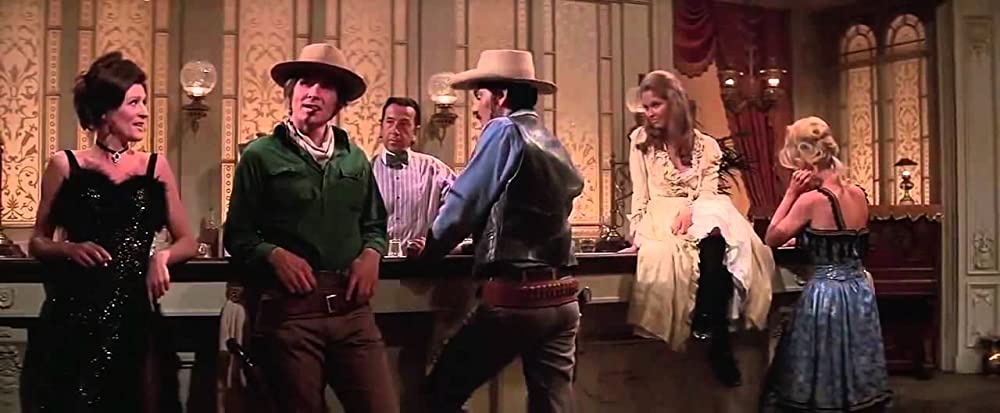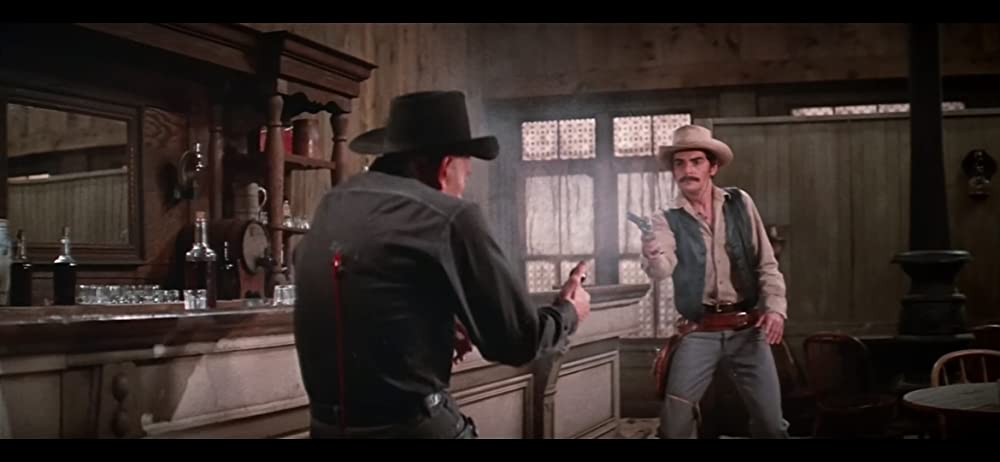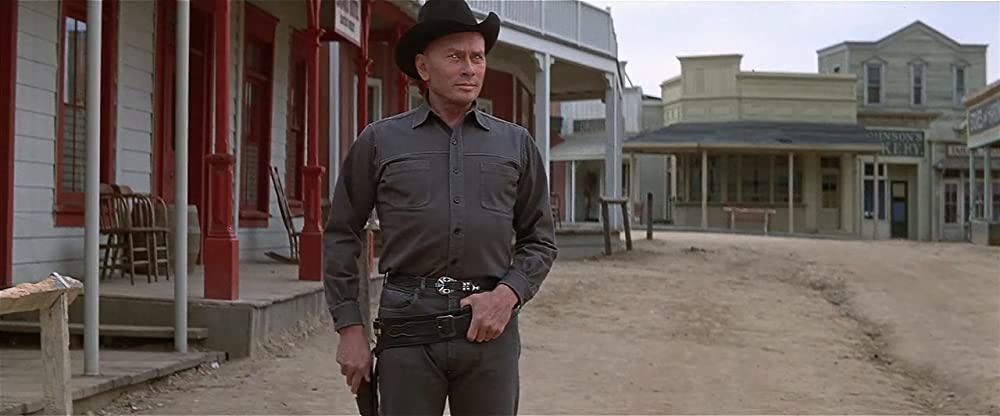
It’s been such a long time since Westworld was the definitive killer robot movie that you might be shocked at just how many stock ideas it pioneered, in Sci-Fi stuff and in monster movies in general. An implacable murder machine (with RobotVision® POV shots, in the first use of digital effects in a film) would go on to become the iconic variation of the killer robot, thanks mainly to The Terminator (a movie that owes more than a little to this one), and the story of a theme park going berserk was apparently such a good one that writer/director/novelist Michael Crichton completely reused it in Jurassic Park (Crichton made a few contributions to monster fiction in his time aside from just those two: see also Eaters of the Dead/The 13th Warrior, Congo, Sphere, the nanomachine nonsense Prey, and the lesser robot thriller Runaway.) But it’s also worth noting that even the “management refuses to close the park” trope occurs here before it is codified again in Jaws two years later—which I think also gets into one of the real innovations of this movie, which was the context. The robot movies I wrote about before presented robots as decidedly non-quotidian: Gog had robots built for scientific and exploratory work, and Screamers (which was based on a story from the fifties, remember) had robots as war machines—practical uses for thinking machines. Westworld, however, shows a world in which this futuristic tech is used in the pursuit of leisure and also, implicitly, in the pursuit of corporate profit (Disneyland and its many animatronics were a fairly new thing at the time.) Advanced science and robotics were no longer solely the realm of “higher” causes, but also of more common (or base) desires, which changes not only who gets caught in the crossfire when things inevitably go wrong, but also gives it an even more cynical edge than other technology-gone-wrong stories. What this movie says is that killer robots aren’t just a problem for scientists anymore.

The plot is simple: Delos is an exorbitantly-priced (One thousand dollars a day! In 1973!) adult theme park out in the middle of the desert (which you travel to by needlessly-futuristic-looking hovercraft with the most seventies interior possible), with three themed lands populated by highly advanced androids who are built solely to fulfill the fantasies of patrons. You can tell a robot from a human because of the former’s flawed-looking palms, which is a weird detail for the designers to give up on, but it gets the uncanny valley point across. Our protagonists, played by Richard Benjamin and James Brolin (who spends the whole movie cosplaying as Clint Eastwood’s Man With No Name), are booked in Westworld, the old west-themed part of the park, where they partake in random acts of sex and violence, the ultimate escapism. We regularly cut to the technicians working behind the scenes to keep this park running (including numerous creepy scenes with the inactive robots being tweaked in the sterile underground labs), who notice a series of escalating problems with the robots, but management chooses not to shut down the park, leading to the inevitable. The back half of the movie is focused on Benjamin’s character attempting to escape Westworld’s resident outlaw gunslinger, played by Yul Brynner (more or less playing a variation on his character from The Magnificent Seven), who was made to lose duels with visitors but who is now lost all limitations and has become a seemingly unstoppable pursuer.
There isn’t much spent on the backgrounds of any of the characters—we are briefly told that Benjamin’s character is coming off a divorce and is joining his park regular buddy to get away from it all, but that’s about it. We actually spend quite a bit of time with some completely unnamed characters, a nebbish who ends up becoming sheriff of Westworld, and a guy having a good time at the knights-and-castles-themed Medievalworld (we don’t see a lot of the third park, Romanworld, but the descriptions provided make it sound like a 24/7 orgy), and I think we see just enough of their actions and reactions in and out the parks to understand what kind of people they are. We don’t really need a whole lot of motivation to get why these people are there—I think the audience can grasp the sorts of people who would pay a thousand a day for that sort of experience without being told explicitly.

What’s interesting to me now is seeing how well Benjamin and Brolin’s characters fit into the modern theme park enthusiast archetypes that I’ve come to understand (as someone who has never been a theme park.) Brolin is the season pass holding megafan, someone into the whole experience of the park, buying wholesale into the immersive theme (but also fully willing to take advantage of its intricacies when he wants), and wanting nothing more than to share that feeling with his friend. Benjamin’s character is initially reluctant to really get into things (see him trying to order a modern drink at the bar rather than just downing whisky like the rest of them) and is always impressed when he finds out just how many things in the park are robots—I think he asks and then replies to the information with “Wow!” at least three times within fifteen minutes. Brolin is the one encouraging him to indulge himself and get over his initial discomforts, and relishes every moment spent there having his whims met by the robots and by the unseen staff—but also, like most hardcore theme park visitors, he is also shown to get really irritated when something goes wrong, as we see when he is bitten by the robot rattlesnake, the first real sign that the robots are out of control. In another scene after that, the guy we’re following in Medievalworld has one of the robot ladies in the castle reject his advances, and it’s treated as an equal problem, because the guest’s enjoyment (and the robots’ compliance) is the only goal of the people running the place.

While the parks are meant to be recreations of these settings, what they really are are recreations of the Hollywood movie versions of those settings—all the androids are playing stock characters who spout stock dialogue, and the “random events” (which, as we see, are fully determined by the technicians), like bank robberies or barroom brawls, are cartoonish exaggerations, complete with goofy old-timey music (which transitions to broken-sounding electronic music in the second half.) The blatant fakeness is maybe why the patrons are so willing to partake in extreme actions while they’re there—Brolin encourages Benjamin to murder the Gunslinger at the slightest provocation (always in a surprisingly bloody fashion) and to pursue the many comely lady robots who are there for that distinct purpose. The sheer possibility for “safely” unleashing your id at the park is seemingly part of the story’s satirical intent, but while it’s implied that people go even further than that (the opening of the film is a commercial for Delos where visitors are interviewed, with one man saying “I shot six people!”), the movie never really goes there (aside from maybe the jailbreak that ends with the robot sheriff being shot), which could be to keep the rating down, or maybe because Crichton didn’t want his protagonists to be seen as detestable. Even so, the meaning is clear: this is true fantasy in the flesh, the artificiality meant to encourage you to exploit the fake people without consequence, and whatever happens in Westworld, stays in Westworld.

The morality-free playground atmosphere of Delos also, in hindsight, makes one think of modern open world video games, where the design ostensibly has players follow the rules in order to play their designated roles, but certainly doesn’t stop them from going off-script and taking advantage of the systems. The way Brolin helps Benjamin get out of jail after he shoots the Gunslinger for the second time (or the way they choose to ignore the bank robbery happening outside so they can screw a robot, with the sounds of gunfire punctuating their love-making) feels like the emergent gameplay that we hear so much about, up to and including just how secretly manipulated by the developers that “emergent” stuff is. In that mindset, the crisis being the AI deciding not to do what they’re supposed to still feels very appropriate.

The mechanics for how the robots turn on everyone is given a rather vague, handwave-y explanation—as the other lead technicians tell their supervisor (played by Alan Oppenheimer, AKA the voice of Skeletor), the malfunctions seem to be spreading like a disease, and they also say that since some of the tech inside the robots was designed by computers, even they don’t fully understand how they work (shades of “Second Variety.”) One interpretation of that is that they’re so advanced that they’re beginning to gain sentience (this seems to be the one chosen by the recent TV series reboot), but considering what they end up doing, what kind of sentience could they have gained? For the most part, the robots we see attacking guests are simply going through with their designated roles, only without the safeguards that made sure they didn’t do any damage (there is something to be said about how the people living out these “manly” fantasies need a system that makes sure they always win.) In that sense, the robots in Delos are scary not because they’re actively turning against us, but that the mechanisms that made them harmless are turned off—there was only ever a thin line between the “pretend” violence and the real thing.

The embodiment of that is, of course, Yul Brenner’s Gunslinger, who from the moment he appears on screen never seems anything less than frighteningly inhuman even before we see his face taken off, or get those RobotVision® POV shots (which are almost quaint in their simplicity.) Brenner gets all the credit for his acting here, with a bare minimum amount of dialogue—he’s not playing this as an emotionless machine, more an unflappable one, and he exudes a lack of humanity without doing anything particularly robotic (even when he is confused by his own infrared sensors, leading to his destruction in a good old-fashioned monster-lit-aflame scene.) It’s pretty easy to tell just how much both Terminators are based on his performance—see the part where Brenner suddenly starts running after methodically chasing the guy for most of the movie to get that T-1000 energy. What’s especially frightening is that before the turn, someone like Benjamin’s character could deal with him quite easily, which would seemingly make him less intimidating, but when the turn happens, you immediately feel just how dangerous he is. Like many of the most dangerous robots in fiction, he is simply too good at what he was made to do.

Westworld is one of those movies where the trappings of it could seem a little bit dated—the clothes, the interiors, the hairstyles—or a little silly (there’s just an uncovered manhole leading to the control centre in the middle of the park?), but the ideas in it are still trenchant, and relevant: we are building things for the wrong reasons, and putting them in the hands of the wrong people. Now that technology is even more ubiquitous, and even more being controlled by questionable people, something like Delos is just as believable now as it was when robot-filled theme parks were new. Even beyond that, though, this movie created new tropes and new styles for monster movies, showing how you can make something look as close to human as possible while still making them as frighteningly otherworldly and unstoppable as anything that openly wears its inhumanity.
